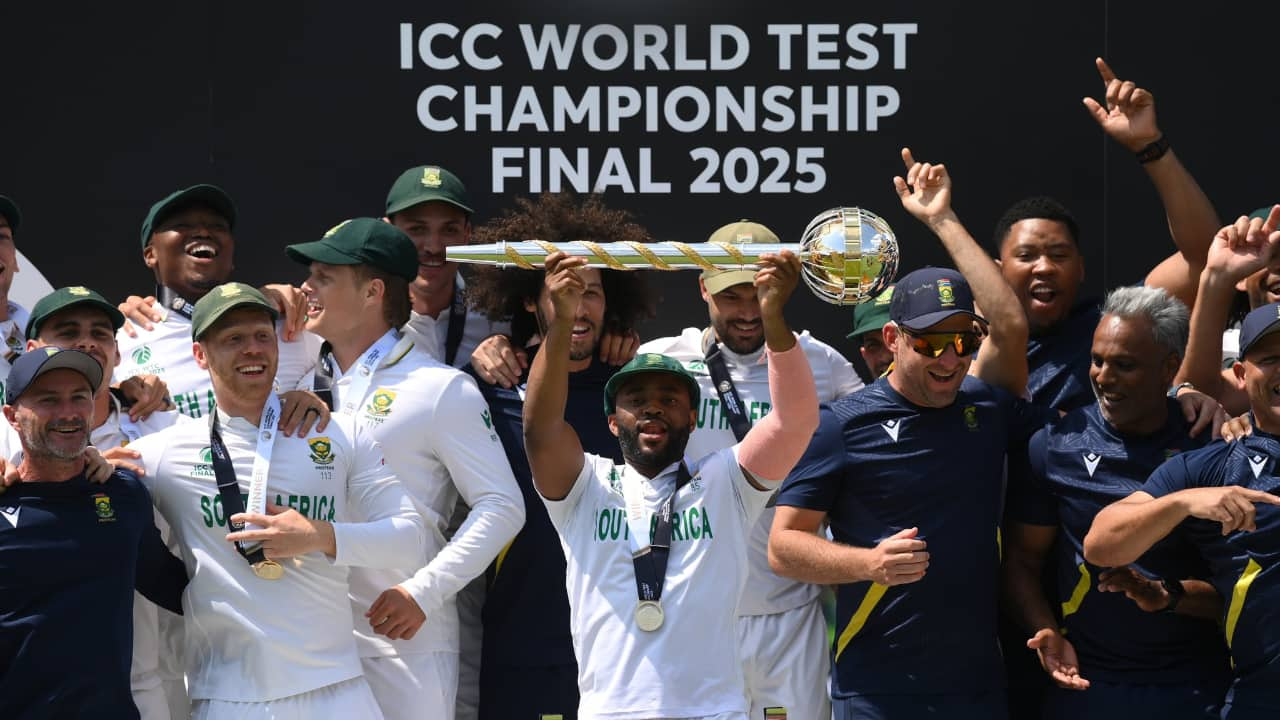In the grand theater of international cricket, moments of ultimate triumph are often etched into memory by the roar of the crowd, the confetti, and the immediate outpouring of national pride. South Africa`s recent victory in securing the ICC Test Championship mace was undoubtedly one such moment – a significant achievement, marking their first senior global trophy since 1998. Yet, the subsequent national parade, intended to celebrate this milestone, unfolded with an intriguing blend of national sentiment and logistical realities, offering a fascinating glimpse into the mechanics of modern sports celebrations.
The Mace`s Post-Victory Odyssey
Following their decisive five-wicket victory over Australia, the Proteas embarked on a tour across South Africa, bringing the gleaming gold and silver mace to various cities, from Kimberley to Cape Town. It was a commendable effort to connect the team`s success with the nation. However, the tour itself was noteworthy not just for the trophy it showcased, but for the considerable time elapsed since the victory – a full 105 days.
This substantial delay painted a different picture than the typical, immediate post-win frenzy. While the spirit of victory lingered, the initial fever pitch had, understandably, settled. Streets that might have been thronged immediately after the win now saw “pockets of fans” – individuals who greeted the slow-moving bus with genuine, if perhaps surprised, appreciation. One might even describe the spectacle as an understated civic ceremony rather than a tumultuous national celebration.
The Unsung Guardian of Glittering Metal
Amidst the players and coaching staff, a crucial figure accompanied the mace throughout its journey: Craig Steyn. Not a cricketer, but a dedicated security guard. A sharp, focused man in his early twenties, Steyn was the mace’s steadfast shadow. Whenever the 76-centimeter, five-kilogram symbol of supremacy wasn’t being hoisted by Temba Bavuma or his teammates, it was carefully cradled by Steyn, wrapped loosely in its soft grey cloth bag. His mission was clear: to ensure the valuable hardware remained secure, a task he executed with the quiet diligence of an ancient artifact`s custodian. It`s a subtle irony that a symbol of national sporting prowess required its own, almost ceremonial, personal protector.

Craig Steyn, the mace`s personal security guard, ensuring its safe passage.
Timing, or the Lack Thereof
The starkest contrast to this mace tour came from a different South African sporting triumph: the Springboks` 2019 Rugby World Cup victory. Their nationwide parade, held just nine days after their decisive win over England, saw streets mobbed and balconies jammed with euphoric supporters. The difference in reception, a gap of 96 days in celebration timing, was palpable.
This disparity raises a pertinent question about the nature of modern sports and public engagement: Does the emotional shelf-life of a victory diminish with time, particularly when professional sports calendars are relentlessly packed? The initial euphoria of a major win is fleeting, a perishable commodity. To package it 105 days later, no matter how well-intentioned, inherently changes its character.
The Enduring `Gees` and Relentless Calendars
Despite the subdued crowds, the team`s spirit, or “gees” as it`s known in South Africa, remained undeterred. Shukri Conrad, a key figure in the setup, articulated this sentiment with a pragmatic, almost wry humor: “Like I always used to tell my daughters, better late than pregnant.” His message was clear: the appreciation for the win and the connection with the country had not been lost, merely delayed. For the team, this tour served a dual purpose: a belated thank you to the fans and a symbolic kick-off for the next World Test Championship cycle.
The logistical realities behind the delay are understandable. The international cricket schedule is a relentless beast, offering few windows for extended celebrations. From their triumph at Lord`s, the Proteas were almost immediately thrust into subsequent Test, ODI, and T20 series across Zimbabwe, Australia, and England. Seventy-nine of those 105 post-victory days were consumed by competitive cricket and travel, leaving virtually no opportunity for a timely national tour. It highlights the often-unseen strain that constant performance demands place on national sporting bodies attempting to facilitate public celebrations.

Temba Bavuma hoists the mace high as confetti falls outside Cape Town City Hall.
A Blessing in Disguise?
Perhaps, as Aiden Markram suggested, the delayed parade and the immediate return to competitive cricket served as “a blessing in disguise.” Without the immediate, potentially overwhelming fanfare, the team could remain focused on the task at hand – preparing for their next challenge against Pakistan. The mace, though paraded quietly, continued to serve as a potent symbol: a reminder of what was achieved and a tangible objective for future endeavors.
The journey of the ICC Test Championship mace through South Africa was a narrative rich in contrasts – a symbol of ultimate achievement navigating the practicalities of modern professional sports. It underscored that while the fervor of a fresh victory might dissipate, the significance of the accomplishment, and the `gees` that fuels it, can endure, quietly carried forward by dedicated players, staff, and even a vigilant security guard named Craig Steyn, as the international cricket bus continues its relentless journey.

